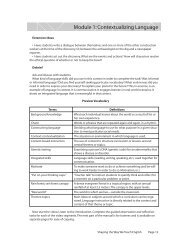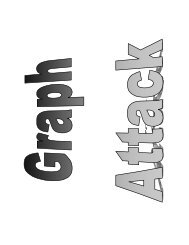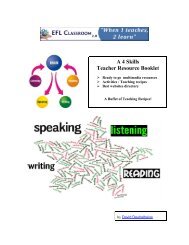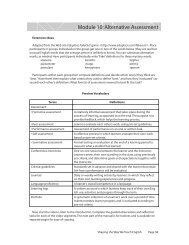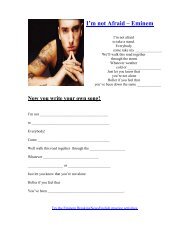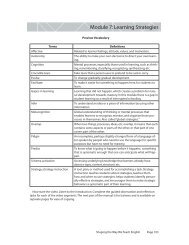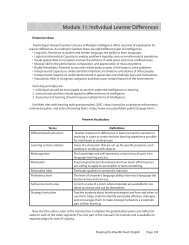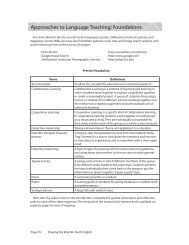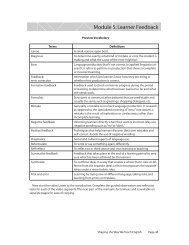Ten Audience Analysis Exercises - EFL Classroom 2.0
Ten Audience Analysis Exercises - EFL Classroom 2.0
Ten Audience Analysis Exercises - EFL Classroom 2.0
Create successful ePaper yourself
Turn your PDF publications into a flip-book with our unique Google optimized e-Paper software.
8. Assign students the task of writing a letter to entering students at your school who<br />
will encounter your computer-based classroom for the first time. What can they<br />
tell these new students about the space and how it works? What information do<br />
they wish they had had when they first began using the classroom? You might<br />
combine this writing assignment with the student ethnography paper (#2, above)--<br />
asking students to write their letters after having observed the space and thought<br />
about the community that exists in it.<br />
9. Turn your students into computers (metaphorically, of course). From the<br />
computer's perspective, ask them to observe, analyze, and evaluate the humans in<br />
the room. If the assignment seems hard to get started on, appeal to popular culture.<br />
Ask students to assume a thinking persona for the computer in the same way that<br />
Star Trek: The Next Generation's Data, Voyager's The Doctor, or Lost in Space's<br />
The Robot take on human qualities even though they are machines. Ask them to<br />
think about how the machine would evaluate the space. What role would the<br />
machine think it fills? What does it think of these humans who sit down in front<br />
of it? Papers might be first-person narratives on a day in the life from the<br />
computer's point of view ("I was resting here happily, drawing fractals. I was sort<br />
of pleased with the fuschia one, and then I felt one of them reach over and move<br />
my mouse. Damn. They want me to work again. Don't they understand how<br />
peaceful it is to sit and draw fractals?"), position papers (a computer writes, "Why<br />
I Should Be Networked"), or a reflective essay evaluating the roles that it has<br />
played over time (e.g., a hand-me down computer from the Math Lab reflects on<br />
the things it's seen and the differences between the two labs it has lived in).<br />
10. Put your students in the future, looking back at your classroom. Ask them to<br />
imagine that they have come back for their ten (or twenty, etc.) year reunion.<br />
They run into one another and decide to find the old classroom. Miraculously, it's<br />
still there (though it's very likely to have changed greatly). For their assignment,<br />
ask students to reflect on their experiences in the place and to comment on how<br />
the computer-based classroom influenced their education (and the things they are<br />
doing now that they are graduates). The point is to ask them to think about what<br />
they think that they will value (or not) about having had a class in your computerbased<br />
classroom once they have moved on to other places and experiences. They<br />
might write their thoughts in the format of a letter or article for the alumni<br />
newsletter, or they might compose their reflections in a letter to a politician or<br />
campus administrator, urging more (or less) support for computer-based<br />
classrooms.



